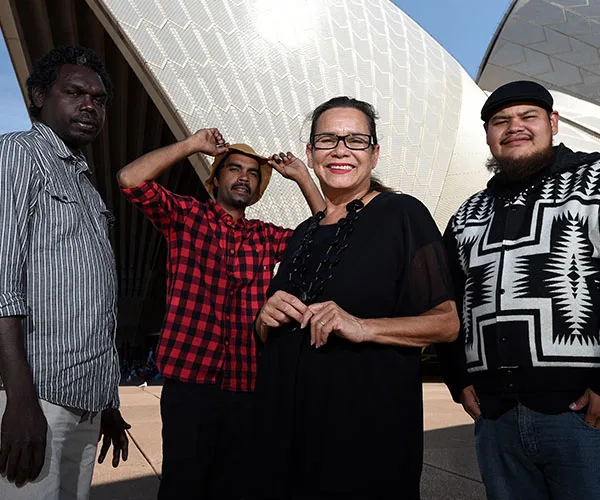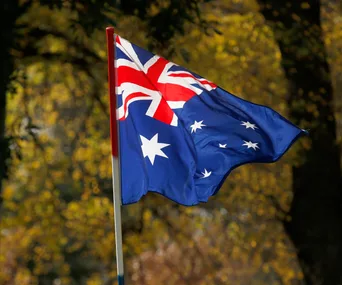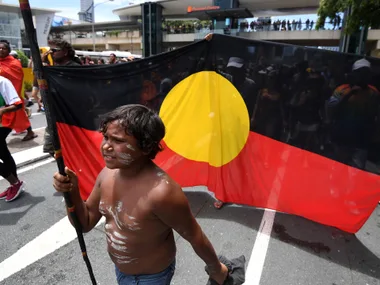As the fierce media debate surrounding the Australia Day date change comes to a head, many of us will heave a sigh of relief.
Not because we want to shy away from discussing a date shrouded in controversy, but to escape the continual farce of “pitting Aboriginal people against Aboriginal people” for televised debate.
While January 26 is undoubtedly still a cause for contention that needs to be addressed, focusing solely on a date change and failing to discuss the deeper problems inherently tied to the issue could be detrimental to our society and moving forward as one.
Rhoda Roberts AO, Head of Indigenous Programming at the Sydney Opera House, spoke to The Australian Women’s Weekly about the importance of not viewing Indigenous people as one homogenous group and what January 26 means to her personally.

Rhoda Roberts, (second from right), talks about why we should move Australia Day from January 26.
(Credit: Getty)The greatest day of my life was January 26, 1988. I was marching with over 40,000 Australians in protest and pride.
Afterwards, Nanna Walker [Oodgeroo Noonuccal] said, ‘You know, I used to be worried where we would find our future leaders. Where are our leaders?’ she motioned around her: ‘They’re here.’
Being among tens of thousands of people in a sea of black, red and yellow, Nanna Walker wasn’t just talking about the Aboriginals marching – she meant the white Australians marching alongside us too.
There was no division between top end and Aboriginals from the south either – no question if you were ‘Aboriginal enough’.
When we walked through the tunnel near Central Station, we heard a growing rumbling which transformed into a bellowing roar. We were met outside the tunnel with Australians shouting and cheering for us. They’d stood in the heat and the sun for hours waiting for us.
They got it. They knew we didn’t, and still don’t, have a problem with them; we don’t want to be divided.
More than anything we want to be united, and that’s what this whole thing is about.
The extremely problematic date of Australia Day
I don’t call it Australia Day, or Invasion Day or Survival Day. I call it January 26. Because that’s what it is; it’s a day when men on boats came to our shores and shot our people.
Did they invade? Did they begin a war? Is it genocide? – I don’t have answers for people, all I have is questions
General Phillip came on a boat, into what is now known as Circular Quay, and when our First Nations people welcomed him, he shot them.
They lied. They’d claimed Terra Nullius and they needed to get rid of the people living there. Is that starting a war?
Land doesn’t belong to anyone, but we resided on this land for 3000 generations and then suddenly we were being abused and violated. We were forced to wear chains, women were raped, men were decapitated. Is that genocide?
We get bogged down in semantics. We should be asking: Is this different to what happened at the Somme?
Men got on a boat, my relatives included, they travelled to a foreign land, and they shot people. We call it war.
They shot people because they didn’t want any Australians to experience genocide because of the colour of their skin or what they believed in. Every Anzac Day we honour those who died with a holiday that has only grown in reverence and patriotism.
We’re often reminded of the genocide during World War II and continue to pay our respects deeply, as we should. Like Jewish people, we lost thousands and thousands of our ancestors. Unlike Jewish people, we don’t have a day to talk and reflect on the pain we experienced.
January 26 is a date that will never go away – a pain that will never go away. Just like the pain for those with ancestors who died in Gallipoli and at the Somme will never go away. Why do we allow one sector of our country to mourn, but not another?
We’re not even respected by those who claim to be our leaders. If the Jewish Museum was shut down, ignored, there would be mass outrage, but there is no outcry for us. If someone branded their religious ceremony ‘bullshit’, leaders from all over would defend them. When our smoking ceremonies, a part of our religion, a ceremony linking us with our ancestral land, was called ‘bullshit’, not one leader stood up for our religion.
If we really wanted reconciliation, we’d honour our slaughtered First Nations people in the same way we honour the diggers. We would have time to reflect, to mourn, to honour, and we could still go down to the pub and have a beer after.
Beyond the date change: the fight for visibility
I’m not sure a date change will help. If we move it to another day, will people forget? Our truth has been suppressed for so long, we need more than a date change: we need visibility.
With visibility, we can move forward. We’re still fighting for visibility in media. Still our First Nations people are subjected to profiling – we’re told all Aboriginals think the same way. Healthy discussions are essential, but that’s not what we have.
Of course there are some Aboriginals who are right wing, and that’s okay. There are Aboriginals who are left leaning politically, and that’s fine, too. But instead, every year, we see lateral violence. The media pits black against black and all we see is people being shouted down, the hatred growing and pustulating.
No one has to feel guilty but there is understanding and forgiveness.
We need to refocus our energy instead of seeing January 26 as a day to get pissed.
We live in a beautiful country, and I’m so hopeful thanks to young people. They are so determined to close the gap – to learn about our culture, to learn the truth and to not forget.
The government hasn’t gotten rid of us. We’ve been violated, had our children stolen, and still we remain.




